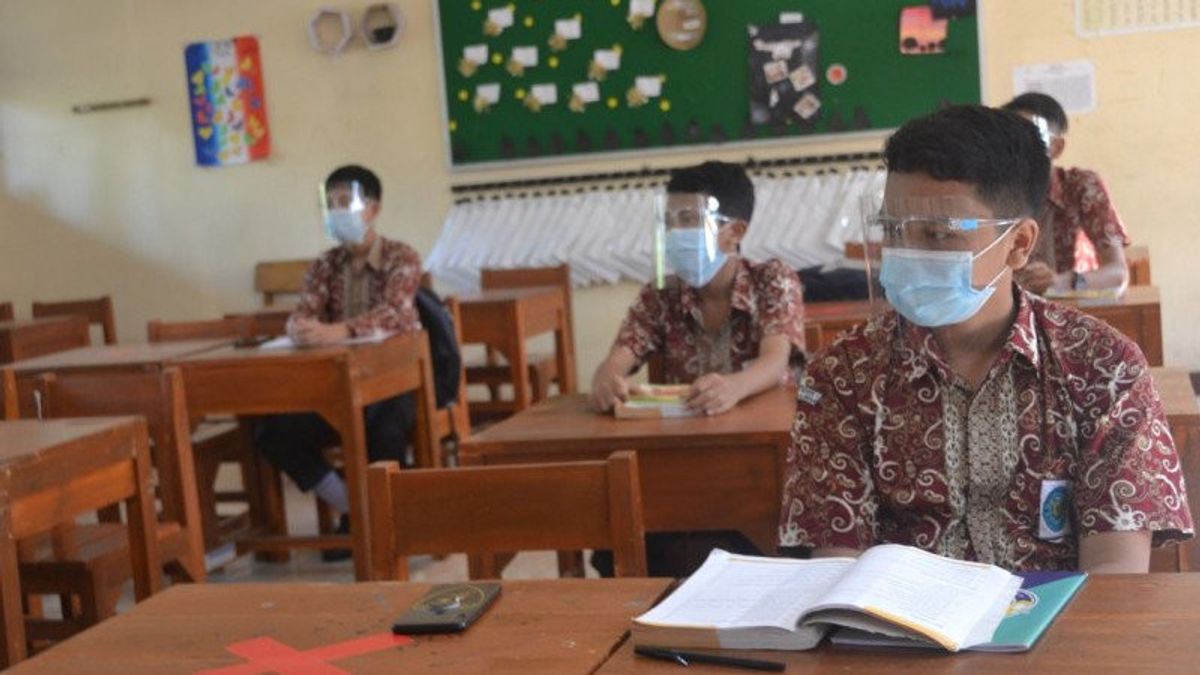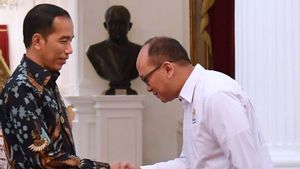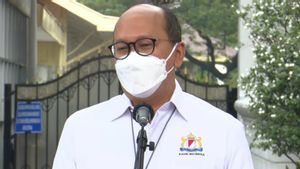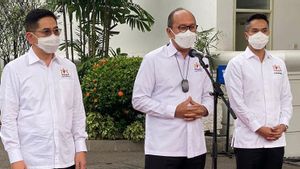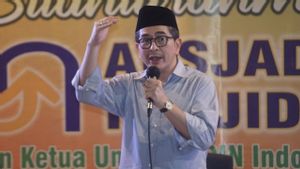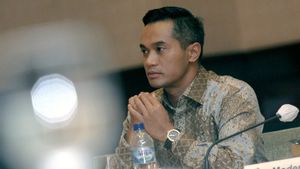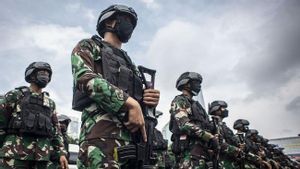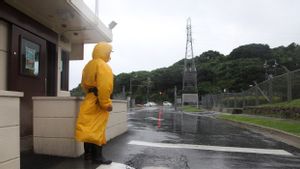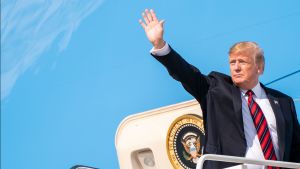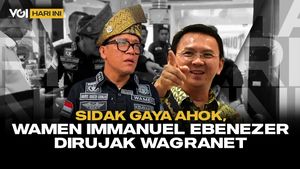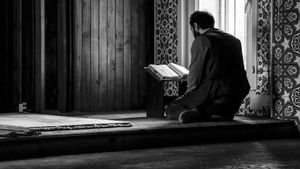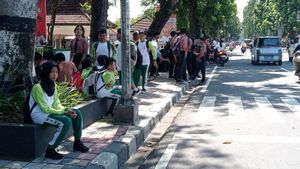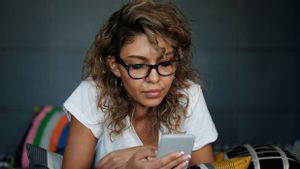JAKARTA - The Ministry of Education, Culture, Research, and Technology (Kemendikbudristek) emphasizes that the implementation of face-to-face learning (PTM) is limited depending on the readiness of schools and regional conditions.
As reported by Antara, Wednesday, July 7, parents or guardians of students have full authority to allow or not their children to participate in limited PTM at school. The implementation of limited PTM must be carried out with strict health protocols, carried out in stages and adjusted to the dynamics of the development of COVID-19 cases in each region.
Minister of Education, Culture, Research, and Technology (Mendikbudristek), Nadiem Anwar Makarim reiterated that the implementation of limited PTM is an option that must be given if the school is really ready to implement it.
Before holding a limited PTM, said Jumeri, schools must meet the requirements set out in the Joint Decree of the Four Ministers and prioritize the precautionary principle for the health and safety of school residents and their families. Thus, if the local government imposes restrictions on community activities (PPKM), then the implementation of limited PTM can be postponed or temporarily suspended.
The Director-General of Early Childhood Education, Basic Education, and Secondary Education (Dirjen PAUD Dikdasmen), Jumeri in his written statement in Jakarta, Wednesday emphasized that the implementation of limited PTM really depends on school readiness and the development of pandemic conditions in the school area. Limited PTM is also based on the implementation of micro PPKM implemented by the government.
Nationally, he said, it might not be the same from one province to another, between districts and districts, even between districts following the dynamics of COVID-19 in their respective regions.
The Director-General of PAUD Dikdasmen also emphasized that limited PTM is not the same as learning like before the pandemic. The implementation is not simultaneous and is not forced or required for all schools.
The correct concept is to regulate limited PTM by controlling the number of students in each study group to a maximum of half of the total students in the class. There are distance arrangements, students do not have to come to school every day, and schools provide essential materials when PTM is limited.
Furthermore, Jumeri appealed to the education office (disdik) and school principals to ensure that each education unit complies with the checklist. Schools can optimize the use of school operational assistance funds (BOS) for limited PTM preparation.
Schools must prepare SOPs, infrastructure, disseminate the application of a healthy and clean culture, and make collaborative efforts with health facilities and local policymakers.
For parents who are not too comfortable and confident about sending their children to school, they can still choose distance learning (PJJ). Thus, schools also need to facilitate limited PTM and PJJ learning.
Schools also do not need to force the pursuit of learning material achievements on students, what is prioritized is the delivery of essential materials, while the rest can be delivered through the PJJ method.
The government understands that the conditions of every school and every region in Indonesia are very diverse, so it is impossible to generalize. The school will continue to serve students according to their ability to be able to follow the appropriate learning model.
“We are aware and therefore offer two limited PTM and PJJ solutions. Everyone is given a chance,” said Jumeri.
Schools are asked not to discriminate against students who cannot participate in limited PTM. There is no punitive and discriminatory process for children who study from home. Let's encourage our children to stay healthy, but also achieve good learning outcomes, so that our country is not left behind compared to other countries.
SEE ALSO:
The key to successful PTM is limited
The Director-General of PAUD Dikdasmen said that the key to success for PTM was limited to the habit of applying health protocols in a disciplined and strict manner. For this reason, a clean and healthy culture by school residents is very important in suppressing the spread of COVID-19. He suggested that in the first weeks of limited PTM, schools put more emphasis on building a clean and healthy cultural character first.
Give children the opportunity to enjoy limited PTM to build clean and healthy characters, work together and apply discipline to health protocols to protect themselves and their surroundings.
Principals can optimize the use of space in schools, especially open spaces, to be used as a place for learning in limited PTM. The key to preventing transmission is ventilation in the classroom with good air circulation.
"Well, these are the parks that we have in schools, then the fields owned can be used to increase capacity," said the Director-General of PAUD Dikdasmen.
Jumeri added, generally, the increase in the number of COVID-19 cases was caused by the indiscipline of the community in implementing health protocols correctly. For teachers or students who are sick, make sure not to go to school until they are completely healthy. For those who return from traveling outside the region, it is recommended to self-isolate first to ensure the health condition of the person concerned.
Referring to the Decree of the Four Ministers, it is stated that the Regional Government has the authority to stop limited PTM and close schools if there are cases of COVID-19. Then, follow up with testing, tracing, and treatment (3T) protocols according to applicable procedures.
Responding to teachers' concerns about cutting allowances due to sick leave or self-isolation, Jumeri stated that he would coordinate with the education office and regional staffing agency (BKD), where the teachers would be given dispensation to teach from home.
The Acting Director-General of Disease Prevention and Control (Plt. Dirjen P2P), Ministry of Health (Kemenkes), Maxi Rein Rondonuwu, also emphasized the importance of education on behavioral changes to comply with health protocols in face-to-face learning activities. All parties must apply health protocols in a disciplined manner. Teachers must be aware that they have to be responsible for themselves first and protect their students. I ask the principal and the head of the department to make this vaccination a condition for teachers to return to teaching.
He added that it does not mean that after being vaccinated, a free person has been vaccinated, it does not mean that he is free. Even though he has been vaccinated, he still has to follow health protocols because transmission can happen anywhere.
The Acting Director-General of P2P of the Ministry of Health stated that schools could carry out intense coordination with the nearest puskesmas to prepare the required health protocols before the implementation of limited PTM.
"We are ready to support limited PTM," said Maxi.
The main considerations for implementing limited PTM are safety, the physical and mental health of students, educators, and education staff as well as efforts to reduce the negative impact of the pandemic on the psychology of child development and the occurrence of learning loss. To that end, in March 2021, the government issued a Guide for Implementation of Learning in the Time of the COVID-19 Pandemic through a Joint Decree (SKB) of the Minister of Education and Culture, the Minister of Religion, the Minister of Health, and the Minister of Home Affairs. Through the 4 Ministerial Decree, the government encourages the acceleration of limited PTM according to school conditions by implementing health protocols and encouraging the implementation of vaccinations for educators and education personnel.
Guide as a tool
Previously, the Ministry of Education and Culture and the Ministry of Religion (Kemenag) launched Learning Implementation Guidelines for Early Childhood Education, Basic Education, and Secondary Education (PAUD Dikdasmen) during the COVID-19 Pandemic. The guide was presented as an effort to translate the joint decision of the Minister of Education and Technology, the Minister of Health (Menkes), the Minister of Religion (Menag), and the Minister of Home Affairs (Mendagri).
Mendikbudristek said that this guide is a tool for teachers and education personnel at the Early Childhood Education level in facilitating the preparation of limited face-to-face learning (PTM).
Nadiem Makarim said, this step was a response after hearing input from educators and parents.
Minister Nadiem said that stakeholders in the education sector needed operational guidelines as a derivative of the Four Ministerial Decree to facilitate the preparation and implementation of limited PTM.
"We hope that this guide can be studied carefully and implemented as well as possible for the benefit of all of us and of course I will also not stop reminding how important collaboration of all parties is in implementing limited PTM," said the Minister of Education and Technology
Instructions for the Implementation of Learning for Early Childhood Education in Elementary Education during the COVID-19 Pandemic can be downloaded via jointhadapikorona.kemdikbud.go.id and spab.kemdikbud.go.id.
The English, Chinese, Japanese, Arabic, and French versions are automatically generated by the AI. So there may still be inaccuracies in translating, please always see Indonesian as our main language. (system supported by DigitalSiber.id)
